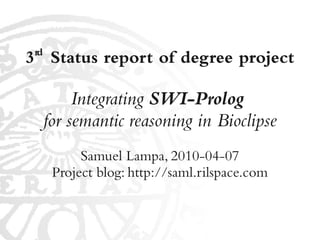
Expressiveness: SPARQL vs Prolog for Semantic Reasoning
- 1. rd 3 Status report of degree project Integrating SWI-Prolog for semantic reasoning in Bioclipse Samuel Lampa, 2010-04-07 Project blog: http://saml.rilspace.com
- 2. Research question How do biochemical questions formulated as Prolog queries compare to other solutions available in Bioclipse in terms of speed and expressiveness?
- 3. Compared Semantic Tools ● Jena ● General RDF querying (via SPARQL) ● Pellet ● OWL-DL Reasoning (via SPARQL) ● General querying via Jena (via SPARQL) ● SWI-Prolog ● Access to RDF triples (both assertion and querying) via the rdf( Subject, Predicate, Object ) method ● Complex wrapper/convenience methods can be built
- 4. Use Case: NMRShiftDB Interesting use case: Querying NMRShiftDB data ● Characteristics: – Rather shallow RDF graph – Numeric (float value) interval matching
- 5. NMR Spectrum Similarity Search What to test: Given a spectrum, represented as a list of shift values, find spectra with the same shifts, (allowing Intensity variation within a limit). Shift → “Dereferencing” spectra
- 6. Example Data <http://pele.farmbio.uu.se/nmrshiftdb/?moleculeId=234> :hasSpectrum <http://pele.farmbio.uu.se/nmrshiftdb/? spectrumId=4735>; :moleculeId "234". <http://pele.farmbio.uu.se/nmrshiftdb/?spectrumId=4735> :hasPeak <http://pele.farmbio.uu.se/nmrshiftdb/?s4735p0>, <http://pele.farmbio.uu.se/nmrshiftdb/?s4735p1>, <http://pele.farmbio.uu.se/nmrshiftdb/?s4735p2>, <http://pele.farmbio.uu.se/nmrshiftdb/?s4735p0> :hasShift "17.6"^^xsd:decimal . <http://pele.farmbio.uu.se/nmrshiftdb/?s4735p1> :hasShift "18.3"^^xsd:decimal . <http://pele.farmbio.uu.se/nmrshiftdb/?s4735p2> :hasShift "22.6"^^xsd:decimal .
- 7. % Register RDF namespaces, for use in the convenience methods at the end :- rdf_register_ns(nmr, 'http://www.nmrshiftdb.org/onto#'). Prolog code :- rdf_register_ns(xsd, 'http://www.w3.org/2001/XMLSchema#'). find_mol_with_peak_vals_near( SearchShiftVals, Mols ) :- % Pick the Mols in 'Mol', that match the pattern: % list_peak_shifts_of_mol( Mol, MolShiftVals ), contains_list_elems_near( SearchShiftVals, MolShiftVals ) % and collect them in 'Mols'. setof( Mol, ( list_peak_shifts_of_mol( Mol, MolShiftVals ), % A Mol's shift values are collected contains_list_elems_near( SearchShiftVals, MolShiftVals ) ), % and compared against the given SearchShiftVals [Mols|MolTail] ). % In 'Mols', all 'Mol's, for which their shift % values match the SearchShiftVals, are collected. % Given a 'Mol', give it's shiftvalues in list form, in 'ListOfPeaks' list_peak_shifts_of_mol( Mol, ListOfPeaks ) :- has_spectrum( Mol, Spectrum ), findall( ShiftVal, ( has_peak( Spectrum, Peak ), has_shift_val( Peak, ShiftVal ) ), ListOfPeaks ). % Compare two lists to see if list2 has near-matches for each of the values in list1 contains_list_elems_near( [ElemHead|ElemTail], List ) :- member_close_to( ElemHead, List ), ( contains_list_elems_near( ElemTail, List ); ElemTail == [] ). %%%%%%%%%%%%%%%%%%%%%%%% % Recursive construct: % %%%%%%%%%%%%%%%%%%%%%%%% % Test first the end criterion: member_close_to( X, [ Y | Tail ] ) :- closeTo( X, Y ). % but if the above doesn't validate, then recursively continue with the tail of List2: member_close_to( X, [ Y | Tail ] ) :- member_close_to( X, Tail ). % Numerical near-match closeTo( Val1, Val2 ) :- abs(Val1 - Val2) =< 0.3. %%%%%%%%%%%%%%%%%%%%%%%%%%%%%%%%% % Convenience accessory methods % %%%%%%%%%%%%%%%%%%%%%%%%%%%%%%%%% has_shift_val( Peak, ShiftVal ) :- rdf( Peak, nmr:hasShift, literal(type(xsd:decimal, ShiftValLiteral))), atom_number_create( ShiftValLiteral, ShiftVal ). has_spectrum( Subject, Predicate ) :- rdf( Subject, nmr:has_spectrum, Predicate). has_peak( Subject, Predicate ) :- rdf( Subject, nmr:has_peak, Predicate). % Wrapper method for the atom_number/2 method which converts atoms (string constants) to number. % The wrapper methods avoids exceptions on empty atoms, instead converting into a zero. atom_number_create( Atom, Number ) :- atom_length( Atom, AtomLength ), AtomLength > 0 -> % IF atom is not empty atom_number( Atom, Number ); % THEN Convert the atom to a numerical value atom_number( '0', Number ). % ELSE Convert to a zero ");
- 8. PREFIX owl: <http://www.w3.org/2002/07/owl#> SPARQL code PREFIX afn: <http://jena.hpl.hp.com/ARQ/function#> PREFIX fn: <http://www.w3.org/2005/xpath-functions#> PREFIX nmr: <http://www.nmrshiftdb.org/onto#> PREFIX xsd: <http://www.w3.org/2001/XMLSchema#> PREFIX rdfs: <http://www.w3.org/2000/01/rdf-schema#> SELECT ?s WHERE { ?s nmr:hasPeak [ nmr:hasShift ?s1 ] , [ nmr:hasShift ?s2 ] , [ nmr:hasShift ?s3 ] , [ nmr:hasShift ?s4 ] , [ nmr:hasShift ?s5 ] , [ nmr:hasShift ?s6 ] , [ nmr:hasShift ?s7 ] , [ nmr:hasShift ?s8 ] , [ nmr:hasShift ?s9 ] , [ nmr:hasShift ?s10 ] , [ nmr:hasShift ?s11 ] , [ nmr:hasShift ?s12 ] , [ nmr:hasShift ?s13 ] , [ nmr:hasShift ?s14 ] , [ nmr:hasShift ?s15 ] , [ nmr:hasShift ?s16 ] . FILTER ( fn:abs(?s1 - 17.6) < 0.3 ) . FILTER ( fn:abs(?s2 - 18.3) < 0.3 ) . FILTER ( fn:abs(?s3 - 22.6) < 0.3 ) . FILTER ( fn:abs(?s4 - 26.5) < 0.3 ) . FILTER ( fn:abs(?s5 - 31.7) < 0.3 ) . FILTER ( fn:abs(?s6 - 33.5) < 0.3 ) . FILTER ( fn:abs(?s7 - 33.5) < 0.3 ) . FILTER ( fn:abs(?s8 - 41.8) < 0.3 ) . FILTER ( fn:abs(?s9 - 42.0) < 0.3 ) . FILTER ( fn:abs(?s10 - 42.2) < 0.3 ) . FILTER ( fn:abs(?s11 - 78.34) < 0.3 ) . FILTER ( fn:abs(?s12 - 140.99) < 0.3 ) . FILTER ( fn:abs(?s13 - 158.3) < 0.3 ) . FILTER ( fn:abs(?s14 - 193.4) < 0.3 ) . FILTER ( fn:abs(?s15 - 203.0) < 0.3 ) . FILTER ( fn:abs(?s16 - 0) < 0.3 ) . }
- 10. “Expressivity”: SPARQL vs Prolog SPARQL PROLOG
- 11. Prolog predicate taking variables How to change “input parameters”? ● SPARQL: Modify SPARQL query ● Prolog: Change input parameter
- 12. Observations ● SPARQL ● Fewer lines of code ● Easier to understand the code ● Prolog ● Easier to change input parameters ● Easier to re-use existing logic (call a method rather than cut and paste SPARQL code) ● Easier to change aspects of the execution logic
- 13. Performance
- 14. Prolog vs Jena vs JenaTDB vs Pellet
- 15. Prolog vs Jena vs JenaTDB
- 16. Observations ● Prolog is the fastest (in-memory only) ● Jena faster with disk based than with in-memory RDF store! ● Pellet with in-memory store is slow ● Pellet with disk based store out of question
- 17. Project plan from last Planned final presentation: 28 april 2010 (BMC B7:101a) Everybody is welcome!
- 18. Thank you! Project blog: http://saml.rilspace.com
